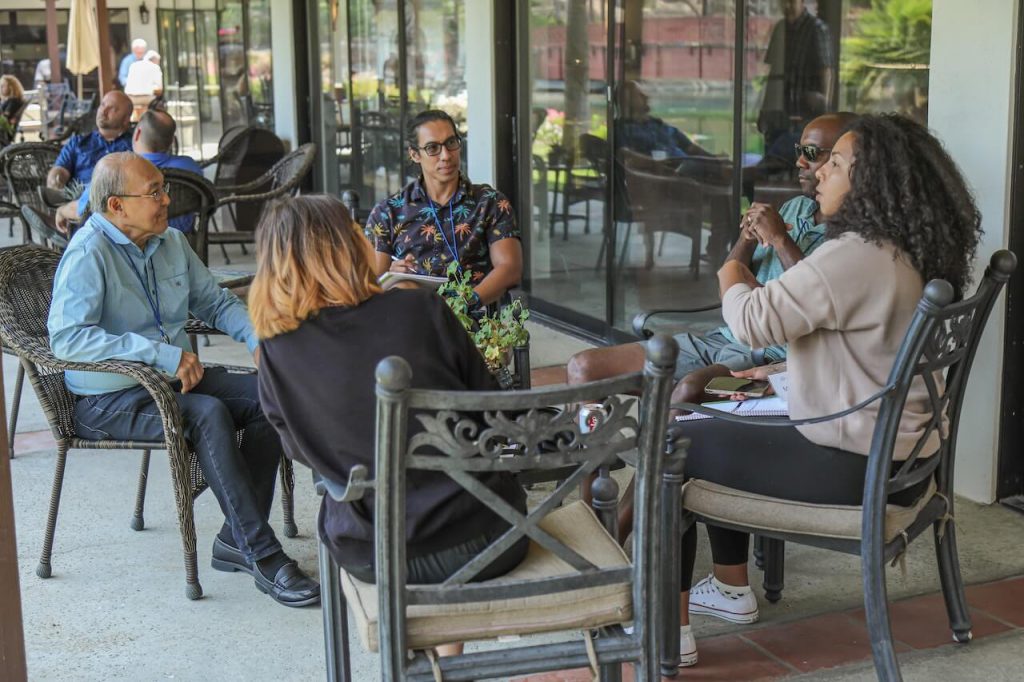All of us come to the table with our own experience, biases, and presumptions about what works best with starting and multiplying healthy small groups in a church. Over time, paradigms (or ways of thinking) about small groups formulate in our minds, which in turn influence the culture of small groups in our churches. This is natural, but should be challenged so the small group culture is being shaped strategically around informed convictions instead of unchallenged paradigms.
One of the best ways of challenging paradigms and building a small group culture that’s based on informed strategy is by asking questions. As you search God’s Word and lean into the expertise of other trustworthy community-building leaders, your paradigms might change or be further solidified. To this end, I propose a two-part exercise that will help you to build a strategic small group culture in your church.
Part 1 of 2 involves taking one-hour to interview the Small Group Point Person of a church in your region that has a fruit-bearing small group culture. (Who knows…this might just jump-start a huddle in your neck of the woods!) Evaluate their website and any other ways they convey a relationally-driven, disciple-making strategy beforehand and take notes in response to these questions you should ask:
- What role do small groups play in your disciple-making strategy?
- What is your church’s vision for small groups? How is this supported from the platform?
- Why do YOU want to see people connect into small groups?
- How do you define a small group? Have you discovered any challenges with having this definition?
- On a scale of 1-10 (with ‘1’ being “if I have time and feel like it” to ‘10’ being “a vital spiritual practice I prioritize weekly”), how important do you think your average church member views their personal involvement in a small group? Explain why.
- What are the qualifications for serving as a small group leader? Would you consider yourself to have a high or low bar? Explain why.
- What is your initial and ongoing strategy for equipping small group leaders? Where would you say is the greatest opportunity for improvement with it right now?
- What does success look like to your small group leadership? How is it measured and celebrated?
- How is growth and multiplication built into the way small groups are communicated and stewarded in your church?
- What is your greatest challenge in building a strategic small group culture in your church?
Write a short summary of your interview that highlights what you learned about building a strategic small group culture. Part 2 of 2 involves having another one-hour conversation, but this time with senior leadership in your church, ideally your Lead Pastor.
This will help you to build off of what you learned from Part 1, but before you do, try to answer these questions yourself so the time with your senior leadership feels less like an interview and more like an inquisitive dialogue. Seeking out answers to these thought-provoking questions will help you and your leadership align and equip you to articulate your small group culture to the leaders you look after more effectively:
- Do we think of small groups as a “ministry” of our church or as the building blocks of every ministry area of our church?
- Do you think the vision for small groups in our church is clear and compelling? What language do we intentionally use to support this vision?
- Do we put more emphasis on joining small groups or starting them? What are the pros and cons of the language we use to support this emphasis?
- Do we consider it to be more advantageous to have a broad/open-ended or narrow/specific definition of what constitutes a “small group” in our church? Explain why.
- What is the primary motivation of getting people in small groups? (Retention, member care, increasing engagement in church activities / volunteerism, spiritual maturity, mission, etc.) Are other critical things being under-communicated as a result of this emphasis?
- On a scale of 1-10 (with ‘1’ being “if I have time and feel like it” to ‘10’ being “a vital spiritual habit I prioritize weekly”), how important do you think our average church member views their personal involvement in a small group? Explain why.
- What are the qualifications for serving as a small group leader? Do we consider ourselves to have a high or low bar? Explain why.
- Do we have an ongoing rhythm of equipping small group leaders after they get started? What is the gap between what it looks like now and what it should look like?
- What does success look like to our small group leadership? How is it measured and celebrated?
- How is growth and multiplication built into the way small groups are communicated and stewarded in our church?
Don’t feel like YOU should have all of the answers. Find a way to process these thought-provoking questions with senior leadership, agree on responses, and document them regardless of your church’s history with small groups. It’s actually a good thing if you walk away from this two-part exercise with more questions than answers.
Take your time to figure out how the Lord is leading you and your senior leadership to build a strategic small group culture that will start and multiply healthy groups throughout your church moving forward! Explore these questions and more with your senior leadership at one of many Accelerate! Small Group Workshops happening over this next year (click HERE for details).





